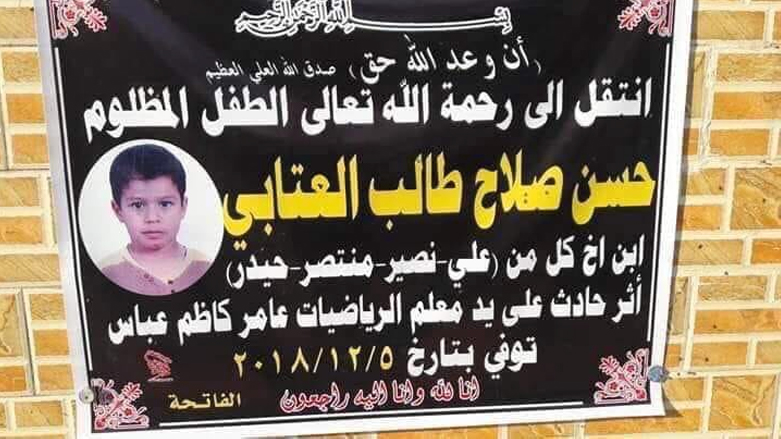Child from Baghdad dies from stroke after teacher beat him
The incident occurred recently when a teacher asked a 10-year-old to stand before his class and shortly after, struck him on the head with a wooden stick.

ERBIL (Kurdistan 24) – A 10-year-old pupil from Baghdad recently died from a stroke after his teacher beat him with a wooden stick, according to the victim’s parents.
The incident occurred on Wednesday when the teacher asked Hassan al-Utabi to stand before his class and shortly after, struck him on the head with a stick, the boy’s family said on Sunday.
It remains unclear why the teacher resorted to violence, which Utabi’s father said had caused a brain hemorrhage that later led to a fatal stroke.
The pupil was a fourth grader at a school in Baghdad’s al-Kamaliyah district, residing in the easternmost part of the Iraqi capital.
Utabi’s teary-eyed father told Baghdad-based al-Ittejah TV that he thought schools were a place of ensured “safety” and never expected his son would one day die there.
The Iraqi Ministry of Education is yet to comment on the incident which has sparked controversy on social media sites. Online users have highlighted the need to reduce the phenomenon of violence against students and pupils in schools.
The tribe to which Utabi belonged has hinted that if the authorities fail to resolve the issue by law, they will resort to what is known in Arabic as “degga ashayariya,” roughly translated to “tribal warning.”
The act is an age-old custom used by powerful Iraqi tribes to settle disputes between two sides.
In their centuries-old system of resolving disputes, representatives of the different clans would usually meet to discuss the case at hand and arrive at a deal to which the sides could agree.
However, should one side fail to attend the meeting, members of the rival tribe would fire on the homes of the absentee and fellow tribesmen in an act of warning, which is what is known as “degga ashayariya.”
With cases getting out of hand, resulting in the death and injury of innocent bystanders or clan members themselves, Baghdad categorized it as a “terrorist act” in mid-November, which could land convicted individuals a death sentence.
“If the clan is not strong, it will not be able to take [what is] its right,” one of the members of the clan said, demanding that none of the school’s staff be allowed to partake in the funeral.
In early October, as the school year kicked off, another student named Rimas al-Janabi, 7, was beaten by a teacher in a Baghdad school. There were also other reports of similar incidents in the nation’s southern provinces.
In October, the Iraqi High Commission for Human Rights (IHCHR) expressed its concern about rising incidents of violence by teachers against schoolchildren in the country, noting that such behavior would increase rates of illiteracy.
Editing by Karzan Sulaivany